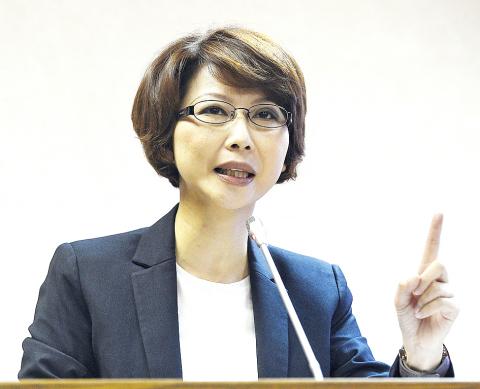Revelations that the military police, along with a military “counter intelligence agency,” have been criticized for operating with a Martial Law-era mentality after the detention and search of a civilian’s house to seize documents.
The scandal over the treatment of a man surnamed Wei (魏) who offered three historical documents for sale online last month has brought to public attention a shadowy military agency — the Military Security Brigade, which was set up as a special body by the Ministry of National Defense Political Warfare Bureau’s Security Division.
The Military Security Brigade is a counter intelligence organization that conducts surveillance, wire tapping, intelligence gathering and other clandestine operations against suspected dissidents and communist spies, and upholds internal security against leaks of state secrets and to investigate criminal activities by military personnel.

Photo: Chen Chih-chu, Taipei Times
The brigade was formerly part of the military’s Counterintelligence Corps and before the overall restructuring in 1992, it was run by the Taiwan Garrison Command, which was responsible for the arbitrary arrest, torture, imprisonment without trial and executions of tens of thousands of Taiwanese during the Martial Law era from 1949 to 1987.
It was often compared to the Stasi secret police of the former East Germany and also described as Taiwan’s Nazi SS unit during the Martial Law era, because the officers of Taiwan Garrison Command swore loyalty only to Chiang Kai-shek (蔣介石) and then his son, former president Chiang Ching-kuo (蔣經國), as they committed atrocities with impunity.
The Military Security Brigade still operates, remaining among the nation’s four intelligence-gathering secret services, the others being the National Security Bureau, the Military Intelligence Bureau and the ministry’s Office of Telecommunications Development.
Military Security Brigade Chief Colonel Wang Shih-wei (汪世偉) was summoned for questioning by prosecutors in the ongoing investigation into the case, while Security Division head Major General Chao Tai-chuan (趙代川) was removed from his post on Tuesday.
At the legislature’s Foreign Affairs and National Defense Committee meeting yesterday, Democratic Progressive Party (DPP) Legislator Chen Ting-fei (陳亭妃) accused the Military Security Brigade of orchestrated the operation, as they had officers accompanying military police personnel to meet Wei and were stationed outside Wei’s house to carry out surveillance throughout the day.
DPP Legislator Wang Ting-yu (王定宇) said he has obtained information that indicated Chao, as head of the Security Division, was the leading figure in the illegal search, coordinating with officers from Military Security Brigade.
Wang accused Chao of telling military police that search warrants were not necessary, and that Chao, along with officers of Military Security Brigade, approved the decision to carry out the operation on Feb. 19 to meet Wei and afterward lied to top military officials to try to cover up the misconduct.

ANOTHER EMERGES: The CWA yesterday said this year’s fourth storm of the typhoon season had formed in the South China Sea, but was not expected to affect Taiwan Tropical Storm Gaemi has intensified slightly as it heads toward Taiwan, where it is expected to affect the country in the coming days, the Central Weather Administration (CWA) said yesterday. As of 8am yesterday, the 120km-radius storm was 800km southeast of Oluanpi (鵝鑾鼻), Taiwan’s southernmost tip, moving at 9kph northwest, the agency said. A sea warning for Gaemi could be issued tonight at the earliest, it said, adding that the storm is projected to be closest to Taiwan on Wednesday or Thursday. Gaemi’s potential effect on Taiwan remains unclear, as that would depend on its direction, radius and intensity, forecasters said. Former Weather Forecast

As COVID-19 cases in Japan have been increasing for 10 consecutive weeks, people should get vaccinated before visiting the nation, the Centers for Disease Control (CDC) said. The centers reported 773 hospitalizations and 124 deaths related to COVID-19 in Taiwan last week. CDC Epidemic Intelligence Center Director Guo Hung-wei (郭宏偉) on Tuesday said the number of weekly COVID-19 cases reported in Japan has been increasing since mid-May and surpassed 55,000 cases from July 8 to July 14. The average number of COVID-19 patients at Japan’s healthcare facilities that week was also 1.39 times that of the week before and KP.3 is the dominant

The Chinese Communist Party’s (CCP) working group for Taiwan-related policies is likely to be upgraded to a committee-level body, a report commissioned by the Mainland Affairs Council (MAC) said. As Chinese President Xi Jinping (習近平) is increasingly likely to upgrade the CCP’s Central Leading Group for Taiwan Affairs, Taiwanese authorities should prepare by researching Xi and the CCP, the report said. At the third plenary session of the 20th Central Committee of the CCP, which ended on Thursday last week, the party set a target of 2029 for the completion of some tasks, meaning that Xi is likely preparing to

US-CHINA TRADE DISPUTE: Despite Beijing’s offer of preferential treatment, the lure of China has dimmed as Taiwanese and international investors move out Japan and the US have become the favored destinations for Taiwanese graduates as China’s attraction has waned over the years, the Ministry of Labor said. According to the ministry’s latest income and employment advisory published this month, 3,215 Taiwanese university graduates from the class of 2020 went to Japan, surpassing for the first time the 2,881 graduates who went to China. A total of 2,300 graduates from the class of 2021 went to the US, compared with the 2,262 who went to China, the document showed. The trend continued for the class of 2023, of whom 1,460 went to Japan, 1,334 went to